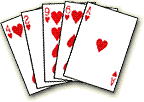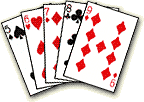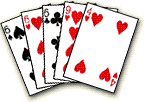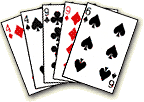Online Poker Rules
The Basics An Overview of Poker
Different Poker Disciplines
Ranking of Poker Hands
Betting Options
Other Practical Poker Information
The Basics - An Overview of Poker
Card Ranking:
In poker, each card has a rank, from the ace (highest rank) all the way down to the 2 (lowest rank). The ace, however, unlike all the other cards in the deck, may sometimes adopt the properties of the lowest card if used to make a straight from ace through 5 (the bicycle or wheel). In standard poker play, the entire 52-card deck is used, but some variations of poker call for the addition of one or two jokers to act as wild cards.
There are different ways to integrate wild cards into a game. Wild cards take on whatever rank or suit an individual wants it to take on in a particular hand. A wild card can either be a joker (which is added to the deck) or you may specify a certain card in the standard 52-card deck to become wild (e.g., deuces wild means all four twos in the deck are wild).
The Hand:
A poker hand is always made up of five cards. For games in which there are more than five cards used/in play, the best five-card hand wins. No suit is more highly ranked than another. Thus if multiple players have the same exact winning hand (e.g., two Royal Flushes, which is almost impossible), the pot is split.
The number of cards dealt depends on the type of poker being played. For instance, in 5-card stud players are dealt five cards and in 7-card stud, players are dealt seven. This might appear obvious, but it is important not to get poker games confused with one another, as they have different rules. 5-card draw is the simplest poker game, and thus it is the game that most people first pick up when learning how to play poker. In this game, five cards are dealt to each player face down and they can draw up to three or four more cards, depending on how many they choose to discard from their original hand.
Traditional poker games use what is called a dealer-button to indicate the position of each hand's theoretical dealer, as a neutral person commonly deals as a service to the players at a table. After each hand is completed, the button moves clockwise to the next active player. This player will be considered "the dealer" for the following hand. In online poker, before the start of each hand a site's poker software generates a fresh deck of cards.
Online poker rooms use what is called a Random Number Generator (RNG) to shuffle a deck of cards before each hand. Each site's poker software generates a random set of numbers, which are used to place each card in the deck in a particular position. Once the complete deck is created," the deck is used for that particular hand only. The deck is shuffled every time a new hand is started, and all random number sequences previously generated are discarded.
Back to Top
Different Poker Disciplines
Each of the poker disciplines below can be played in any of three betting structures: Limit, Pot-Limit, or No-Limit.
Texas Hold'em
Texas Hold em is currently the world's most popular poker game, especially in poker tournament play. In Texas Hold 'em, players are dealt two hole cards, and a total of five community cards are placed face up on the board throughout the rounds of betting. There are several rounds of betting, as well as small and big blinds to be posted in Texas Hold 'em. The game is very widely played in online poker rooms and it can be played either heads-up or against up to nine opponents at once. Many online casinos and poker rooms recommended by poker777.com also provide the option of playing in Texas Hold 'em tournaments. With community cards and complex strategies, Texas Hold em Rules are simple to learn, but can take a lifetime to master. Read more about Texas Hold 'em.
7-Card Stud
With four up cards and three down cards, there are more unknowns in 7-Card Stud than in Texas Hold em or Omaha. Another way this game differs from flop games is that at outset of each hand each player posts an ante, rather than employing the use of small and big blinds. 7-Card Stud is a popular game with old-school poker players, because it is considered a more "pure" form of poker than some other variations on the game, such as Caribbean Poker or Pai Gow Poker. According to 7-Card Stud Rules, each player receives two cards down, four cards up, and a final card down. There are five betting rounds in 7-card stud. Read more about 7-Card Stud
7 Card Stud 8 or Better
7-Card Stud 8 or Better, also known as 7-Card Stud high/low, is played using the same dealing rules as 7-Card Stud, with the exception that in 7-Card Stud 8 or Better Rules, pots can be split between a high and low hand if the low hand qualifies without a card higher than 8. If extra chips remain after a pot is split evenly in two, the high hand receives them. If there is no qualifying low hand, the high hand takes both pots, "scooping" the pot. Read more about 7-Card Stud 8 or Better.
Omaha High
Omaha High, like Texas Hold em, is a poker game that uses five community (or board) cards. In Omaha High, however, players have four pocket cards each. The betting structure is similar to the betting structure employed in Texas Hold em, but the strategy is very different. This is because Omaha High Rules require players to use only two of their four hole cards three of the five community cards to make their hand. Read more about Omaha High.
Omaha 8 or Better
Omaha 8 or Better is also known as Omaha high/low. Like Omaha High, it uses a system of five community cards and four pocket cards for each player. In Omaha 8 or Better, each player can aim for a high hand and/or a low hand. A low hand must qualify with no cards over 8 in the hand in order to win half the pot. Every hand must use two pocket cards and three board cards. According to Omaha 8 or Better Rules, if chips remains after a pot is split between the highest and lowest hands, they go to the higher hand. If there is no qualifying low hand, a player takes both pots, "scooping" the pot. Read more about Omaha 8 or Better.
Back to Top
Ranking Of Poker Hands
The hands below are listed categorically from best to worst.
| Straight Flush |  |
| A straight flush is a sequence of five consecutive cards (such as 7-8-9-10-J) that are all of the same suit. As in a simple straight, a player can have an ace be either high (A-K-Q-J-T) or low (A-2-3-4-5), but you cannot use the ace in a wraparound fashion (i.e., K-A-2-3-4). Therefore, someone who is holding an ace-high straight flush has a Royal Flush and is, in effect, holding the highest possible natural (without wild cards) poker hand. |
|
| Four of a Kind |  |
| Someone holding four of a kind has four cards of the same rank, like four aces or four kings. If more than one player is holding four of a kind, the hand with the higher ranking four of a kind wins. For two players to simultaneously be holding four of a kind is very rare. |
|
| Full House |  |
| A full house is a five-card combination of three of a kind and a pair, such as K-K-K-2-2. When there are two full houses, the winner is the hand with the higher ranking three of a kind. An example would be J-J-J-5-5 would beat 9-9-9-A-A. In wild card games, two players could theoretically be holding the same exact full house, in which case they would tie and split the pot, but this is extremely rare. |
|
| Flush |  |
| A flush is a hand in which all of the cards are of the same suit, such as A-J-9-7-5, all of diamonds. When two or more players hold a flush, the winning hand is determined by the highest card(s) within the flushes. If two flushes have the same high card, the next highest card is the deciding factor, and so on. |
|
| Straight |  |
| A straight consists of five consecutively-ordered cards that are not suited (they can be any combination of the four suits). An example of a straight is 2-3-4-5-6. The ace can either be high or low, so both A-2-3-4-5 and 10-J-Q-K-A are straights. Wraparounds are not allowed (i.e., K-A-2-3-4 is NOT a straight). When multiple players hold straights, the straight with the highest card(s) wins Thus, K-Q-J-10-9 would beat 5-4-3-2-A. If two straights have the same high card, the next highest card is the deciding factor, and so on. If two straits have exactly the same value, the pot is split. |
|
| Three of a Kind |  |
| Somebody holding three of a kind has three cards of the same rank with the remaining cards not being a pair (as having a pair in addition to a three of a kind would constitute a full house). Once again, the highest ranking three of a kind would win if multiple players have three of a kind. If two players have equal three of a kinds (only possible in a wild card game), then the highest remaining card in either players hands (the kicker) would determine the pot's winner. |
|
| Two Pair |  |
| Two distinct pairs of cards and a fifth card. In the event of multiple two-pair hands, the winning hand is determined by the highest pair in a hand. The player with the highest ranking pair wins. If both hands have the same high pair, the winning hand is determined by the second pair. If both hands have the same pairs, the high card (kicker) determines the hand's winner. |
|
| One Pair |  |
| A hand with two of the same ranking card along with three other distinct cards. In the event that more than one player is holding a pair, the person with the highest ranking pair wins. A high card (kicker) breaks ties. |
|
| High Card |  |
| When a hand has none of the above card combinations (i.e., nobody is holding even a pair), then the winner is determined by examining the highest card in each player's hand. The player holding the highest ranking card wins. If there is a tie for the high card then the next highest card in each of the tying hands determines the pot's winner, and so on, until the fifth card, unless there is an absolute tie. The High Card (kicker) rule is also used to break ties when higher hands both have the same type of hand (pair, straight, etc.). |
Back to Top
Betting Options
| Check |
| If it is a player's turn to initiate the betting and he/she does not wish to do so, the player is allowed to check, meaning pass his/her turn. If someone bets, upon this player's next turn, he/she then has the choice to call, raise, or fold. |
|
| Call |
| To call is to match what has been bet by the player or combination of players who acted before you or since your last bet. An example would be if you had bet 25 cents and then somebody raised to 35 cents, you would have the chance to call the additional 10 cents by putting 10 cents into the pot in order to remain playing in the hand. |
|
| Raise |
| To match and increase the amount previously bet by a player or combination of players who acted before you. A friendly game would usually have a limit as to how much money players can raise. If, for example, the initial bet is 25 cents, you can put in 25 cents and than say you're raising another 25 cents, putting a total of 50 cents into the pot. Other players now have the chance to call, re-raise, or fold. Re-raising means that if you or another player had raised, the opposing player could raise back. There is usually a limit to the number of times people can raise/re-raise. |
|
| Fold |
| Someone who folds drops out of the currently-playing hand and loses the possibility of winning the pot. Folding means you are no longer obligated to put in extra money into the pot during betting action. You would only forfeit either your ante or blind (depending on the game being played) along with whatever monies you have already put into the pot. As the Kenny Rogers song says, "you gotta know when to fold them." Sometimes it is just better to get out of a hand rather then waste good money trying to win with bad cards. |
Back to Top
Other Practical Poker Information
Typically, a maximum of four bets, which includes one bet and three raises, are allowed for each betting round, unless the game is no-limit.
The term cap is used to describe the final raise in a round, since betting is then capped and no one can make another raise. Once the betting is capped, players will only have the option of calling or folding.
Poker is typically played "table stakes, meaning only the chips in play (on the table) at the beginning of each hand may be used throughout the hand. This means that players cannot purchase additional chips from the cashier during a hand.
The table stakes rule has an application called the "all-in" rule. The all-in rule provides that a player cannot be forced to forfeit a hand because he/she does not have enough chips to call a bet. A player who does not have enough chips to call a bet is declared all-in by placing all of his/her remaining chips in the pot. This player is eligible for the main pot. All further action involving other players takes place in a "side pot, since the all-in player has no chips remaining with which to participate in future actions for the current hand. If the all-in player has the highest hand at the showdown, this player takes the main pot only. The side pot would then be taken by the player with the next highest hand. If someone other than the all-in player has the highest hand, he/she takes the main pot as well as the side pot.
As there are usually many players at each poker table, players are normally limited in terms of how long they have to act. In the experience of the poker777 staff, most online sites typically allow approximately 30 seconds for a player to act. When 20 or 10 seconds remain, a timer counting down to 0 usually appears on the screen.
If a player is disconnected from an online poker website in the middle of a hand, his/her hand is automatically folded unless the player had already placed money in the pot. If so, the player is declared all-in for that hand and can still win the main pot while being disconnected. Most online poker sites give players 20 extra seconds to act in the event of getting disconnected, if they are able to reconnect immediately.
Back to Top
|


